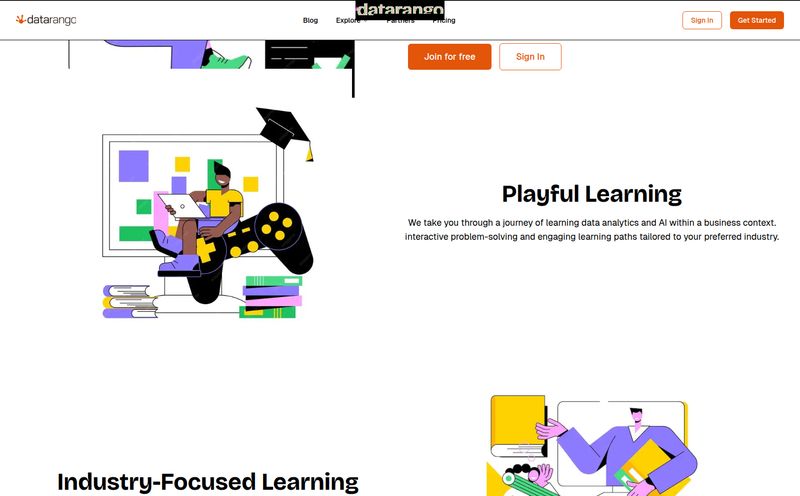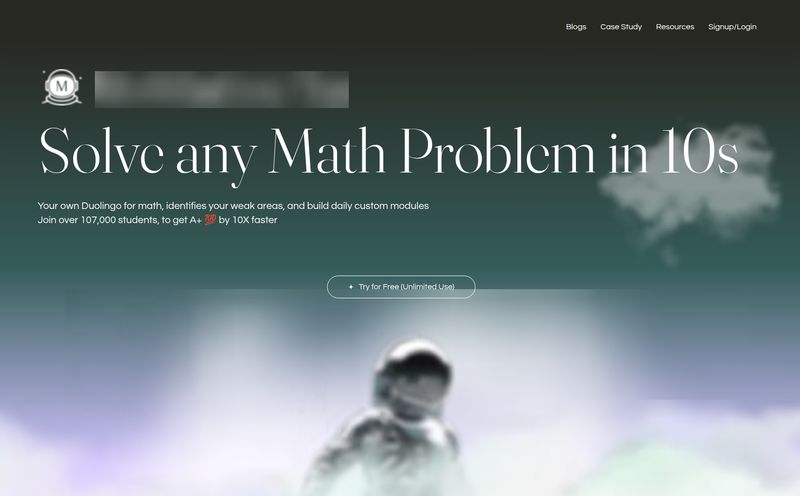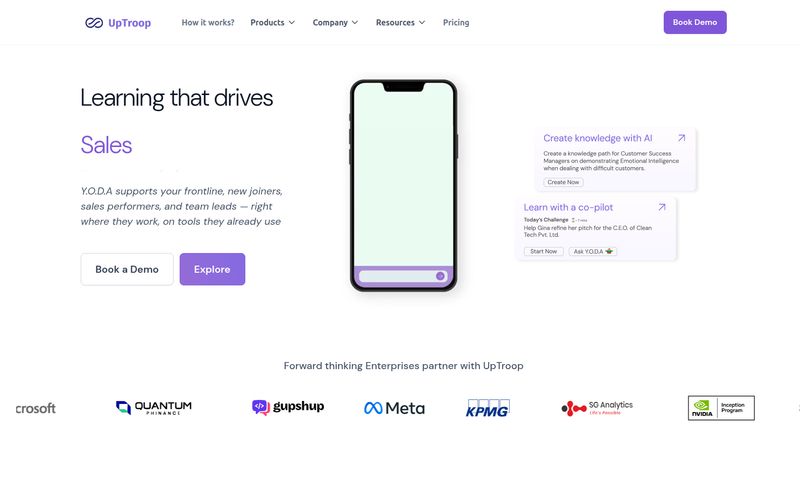The phrase "math homework" can send a shiver down the spine of even the most patient parent. I’ve been there. The long sighs, the eraser dust, the classic “But that’s not how my teacher does it!” It’s a scene that plays out in homes across the country, night after night. For years, the solution was either more parental struggle, or hiring a human tutor, which comes with its own scheduling headaches and, let's be real, a hefty price tag.
But we live in a wild new era. AI is popping up everywhere, from writing emails to creating bizarre art. So, naturally, it's making its way into education. The latest contender to catch my eye is Synthesis Tutor, an AI-powered math platform designed specifically for the little ones. The promise is huge. An infinitely patient, endlessly knowledgeable tutor available 24/7. But as anyone in the ed-tech space knows, promises are one thing. Results are another. So, I decided to take a closer look.
So What Exactly is Synthesis Tutor?
At its core, Synthesis Tutor is an AI math tutor built for elementary-aged kids, specifically the 5-to-11-year-old crowd. Think of it less like a set of digital flashcards and more like a personal math coach. The whole system is built on an adaptive learning model. This means the program pays attention to how your child is doing—what they're getting right, where they're stumbling—and adjusts the difficulty and focus in real-time. It’s not just throwing a hundred addition problems at them and hoping for the best. It's designed to find those little gaps in understanding and build a stronger, more confident foundation from the ground up, covering everything from basic counting to the dreaded fractions.

Visit Synthesis Tutor
The Features That Make It Stand Out
Every ed-tech app boasts a long list of features. But which ones actually matter? After digging in, a few things about Synthesis Tutor really pop.
A Truly Personalized Learning Path
This is the platform's bread and butter. The personalization isn't just a marketing gimmick. The AI actively works to create a unique curriculum for each child. I like to think of it as a personal trainer for their math brain. If it notices your kid is a whiz at subtraction but freezes up on word problems, it won't just keep hammering subtraction. It will pivot, introducing word problem concepts in a gentle, scaffolded way until confidence is built. This is a world away from the one-size-fits-all approach of a standard workbook.
Gamification That Actually Works
"Gamification" is one of those buzzwords that gets thrown around so much it’s almost lost all meaning. Usually it just means you get a few badges and some confetti on the screen. Yawn. Synthesis Tutor seems to understand that real engagement isn’t about cheap rewards; it’s about making the learning process itself fun. The lessons are designed to be interactive and engaging, turning what could be a chore into a challenge your kid actually wants to tackle. The goal is intrinsic motivation—the desire to solve the puzzle—not just to get a gold star. It's a subtle but critical difference.
Progress Reports Parents Will Love
Here’s something that resonates with me as a parent and a professional: data. One of the biggest selling points is that it’s designed to be pretty hands-off for parents. You don't have to hover. Instead, you get clear, concise progress reports. These reports don't just say your child completed 10 lessons. They provide insights into their accuracy and fluency, showing you tangible progress over time. This means you can have a meaningful conversation about their learning without having to re-learn long division yourself.
Who Is This Really For? The Ideal Student Profile
No tool is perfect for everyone. Synthesis Tutor is clearly aimed at the K-5th grade set (ages 5-11). If your child is in middle school or beyond, this isn't for you. But within that age range, it seems particularly powerful. I was especially intrigued by the mention of it being suitable for neurodiverse learners. The self-paced, low-pressure, and highly adaptive environment could be a godsend for kids with learning styles that don't always mesh with a traditional classroom setting. The multisensory approach can help concepts stick in ways that a lecture or worksheet simply can't.
The Elephant in the Room: The AI Approach
Okay, let's talk about the big question. Can an AI really teach a child? Some educators and parents are skeptical, and I get it. There's an undeniable value in the human connection—a teacher who can see the look of confusion on a child's face and offer a word of encouragement. The AI approach, as presented here, might not work for every single child. Some kids just need that human touch to feel motivated and safe to make mistakes.
My take? I don't see tools like Synthesis Tutor as a replacement for great teachers. I see them as a powerful supplement. It's a way to get targeted, one-on-one practice at home that reinforces what's being taught in school, filling in the cracks before they become chasms. It’s one more tool in teh toolbox, and for the right kid, it could be the one that makes all the difference.
Let's Talk Money: Synthesis Tutor Pricing
Alright, this is often the sticking point. High-quality educational tools rarely come free. Synthesis Tutor operates on a subscription model, and they have a few tiers. I've broken it down into a simple table because nobody likes digging through pricing pages.
| Plan Type | Details | Cost |
|---|---|---|
| Individual Monthly | 1 Child | $45 / month |
| Individual Annual | 1 Child | $29 / month (billed annually at $348) |
| Individual Lifetime | 1 Child | $999 one-time payment |
| Family Monthly | Up to 10 Students | $70 / month |
| Family Annual | Up to 10 Students | $33.33 / month (billed annually at $400) |
| Family Lifetime | Up to 10 Students | $1,499 one-time payment |
It's not cheap, especially the monthly plans. The individual monthly plan at $45 is on par with some streaming services and gym memberships combined. However, when you compare that to the cost of a private human tutor, which can easily run $50-100+ per hour, the value proposition starts to look a lot different. The annual plans offer a significant discount, and for larger families or homeschooling co-ops, the Family plans are actually quite economical. The lifetime plan is a huge upfront investment, but if you have multiple young children, it could pay for itself many times over.
My Honest Take: The Good, The Bad, and The Reality
So, where do I land on Synthesis Tutor? It’s impressive. The good is very good. The focus on true personalization through AI, the genuinely engaging gamification, and the parent-friendly progress reports are a powerful combination. The fact that it's designed with neurodiverse kids in mind is a huge plus in my book.
The potential downsides are just as clear. The price will be a barrier for some families, no question. The tight age focus of 5-11 means it has a limited shelf-life for any one child. And, as we discussed, the AI-only model might just not click with every kid's personality. It’s not a magic wand that will instantly make every child a math genius. That's the reality. It’s a highly specialized tool for a specific problem. For the right family and the right child—one who is struggling to keep up, is bored by traditional methods, or could just use a confidence boost—this could be a complete game-changer.
Frequently Asked Questions about Synthesis Tutor
- Is Synthesis Tutor worth the money?
- It depends on your situation. If you're considering a private tutor, it's a very cost-effective alternative. For families with multiple kids in the target age range, the family plan offers great value. It’s best to weigh the cost against the potential academic benefit for your child.
- What age is Synthesis Tutor best for?
- The platform is specifically designed for children aged 5 to 11, which roughly corresponds to Kindergarten through 5th grade in the US school system.
- Can it help my child who struggles with math?
- This is one of its main strengths. The adaptive AI is designed to identify specific areas of weakness and provide targeted practice to build skills and confidence, which is often exactly what a struggling student needs.
- How does it support neurodiverse children?
- The self-paced, low-stress environment allows kids to learn without the social pressure of a classroom. The gamified and multi-sensory approach can also be more effective for different learning styles, such as those common in children with ADHD or autism.
- Is this a replacement for a teacher or school?
- No. It's best viewed as a supplement to formal education. It's a powerful tool for practice, reinforcement, and building foundational skills at home, but it doesn't replace the comprehensive curriculum and human interaction of a school environment.
- What devices can my child use it on?
- The information I found indicates that Synthesis Tutor is available on iPad and desktop computers, offering some flexibility for how your child can access the lessons.
Is an AI Math Companion the Future?
Wrapping this up, I'm cautiously optimistic. Synthesis Tutor represents a smart and targeted application of AI in education. It’s not trying to be everything to everyone. It’s focused on doing one thing—teaching foundational math—and doing it in a way that is personalized, engaging, and effective. The days of one-size-fits-all homework are numbered, and tools like this are leading the charge. While it may not be the perfect fit for every single family, it’s a sign of a very exciting future where learning can be as unique as the child doing the learning. And that's a future that gets me excited.
Reference and Sources
- Synthesis Tutor Official Website: [A placeholder link to synthesistutor.com would go here]
- Brookings Institution - "AI and the future of education": [A link to a relevant Brookings article on AI in education would go here]



